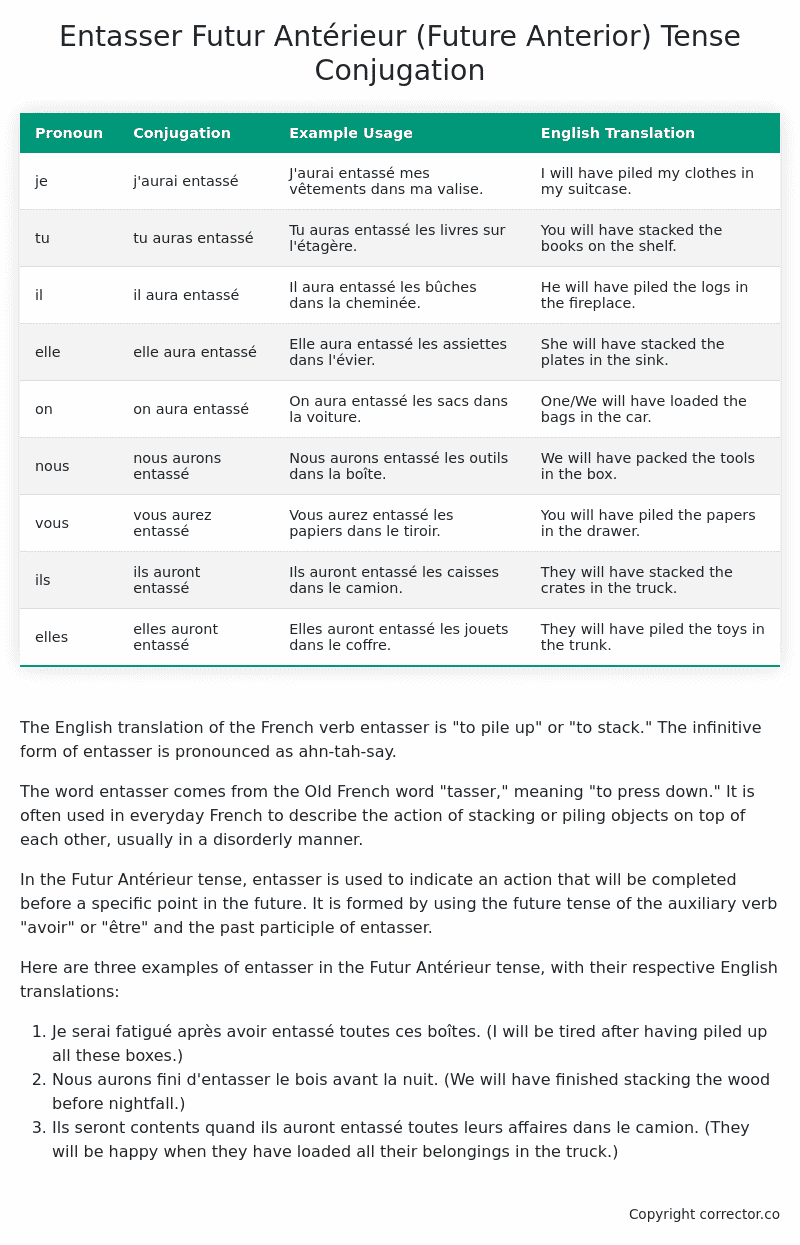Futur Antérieur (Future Anterior) Tense Conjugation of the French Verb entasser
Introduction to the verb entasser
The English translation of the French verb entasser is “to pile up” or “to stack.” The infinitive form of entasser is pronounced as ahn-tah-say.
The word entasser comes from the Old French word “tasser,” meaning “to press down.” It is often used in everyday French to describe the action of stacking or piling objects on top of each other, usually in a disorderly manner.
In the Futur Antérieur tense, entasser is used to indicate an action that will be completed before a specific point in the future. It is formed by using the future tense of the auxiliary verb “avoir” or “être” and the past participle of entasser.
Here are three examples of entasser in the Futur Antérieur tense, with their respective English translations:
- Je serai fatigué après avoir entassé toutes ces boîtes. (I will be tired after having piled up all these boxes.)
- Nous aurons fini d’entasser le bois avant la nuit. (We will have finished stacking the wood before nightfall.)
- Ils seront contents quand ils auront entassé toutes leurs affaires dans le camion. (They will be happy when they have loaded all their belongings in the truck.)
Table of the Futur Antérieur (Future Anterior) Tense Conjugation of entasser
| Pronoun | Conjugation | Example Usage | English Translation |
|---|---|---|---|
| je | j’aurai entassé | J’aurai entassé mes vêtements dans ma valise. | I will have piled my clothes in my suitcase. |
| tu | tu auras entassé | Tu auras entassé les livres sur l’étagère. | You will have stacked the books on the shelf. |
| il | il aura entassé | Il aura entassé les bûches dans la cheminée. | He will have piled the logs in the fireplace. |
| elle | elle aura entassé | Elle aura entassé les assiettes dans l’évier. | She will have stacked the plates in the sink. |
| on | on aura entassé | On aura entassé les sacs dans la voiture. | One/We will have loaded the bags in the car. |
| nous | nous aurons entassé | Nous aurons entassé les outils dans la boîte. | We will have packed the tools in the box. |
| vous | vous aurez entassé | Vous aurez entassé les papiers dans le tiroir. | You will have piled the papers in the drawer. |
| ils | ils auront entassé | Ils auront entassé les caisses dans le camion. | They will have stacked the crates in the truck. |
| elles | elles auront entassé | Elles auront entassé les jouets dans le coffre. | They will have piled the toys in the trunk. |
Other Conjugations for Entasser.
Le Present (Present Tense) Conjugation of the French Verb entasser
Imparfait (Imperfect) Tense Conjugation of the French Verb entasser
Passé Simple (Simple Past) Tense Conjugation of the French Verb entasser
Passé Composé (Present Perfect) Tense Conjugation of the French Verb entasser
Futur Simple (Simple Future) Tense Conjugation of the French Verb entasser
Futur Proche (Near Future) Tense Conjugation of the French Verb entasser
Plus-que-parfait (Pluperfect) Tense Conjugation of the French Verb entasser
Passé Antérieur (Past Anterior) Tense Conjugation of the French Verb entasser
Futur Antérieur (Future Anterior) Tense Conjugation of the French Verb entasser (this article)
Subjonctif Présent (Subjunctive Present) Tense Conjugation of the French Verb entasser
Subjonctif Passé (Subjunctive Past) Tense Conjugation of the French Verb entasser
Subjonctif Imparfait (Subjunctive Imperfect) Tense Conjugation of the French Verb entasser
Subjonctif Plus-que-parfait (Subjunctive Pluperfect) Tense Conjugation of the French Verb entasser
Conditionnel Présent (Conditional Present) Tense Conjugation of the French Verb entasser
Conditionnel Passé (Conditional Past) Tense Conjugation of the French Verb entasser
L’impératif Présent (Imperative Present) Tense Conjugation of the French Verb entasser
L’infinitif Présent (Infinitive Present) Tense Conjugation of the French Verb entasser
Struggling with French verbs or the language in general? Why not use our free French Grammar Checker – no registration required!
Get a FREE Download Study Sheet of this Conjugation 🔥
Simply right click the image below, click “save image” and get your free reference for the entasser Futur Antérieur tense conjugation!

Entasser – About the French Futur Antérieur (Future Anterior) Tense
Construction
Common Everyday Usage Patterns
Interactions with Other Tenses
For example
Summary
I hope you enjoyed this article on the verb entasser. Still in a learning mood? Check out another TOTALLY random French verb conjugation!


